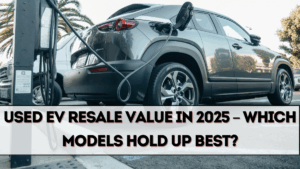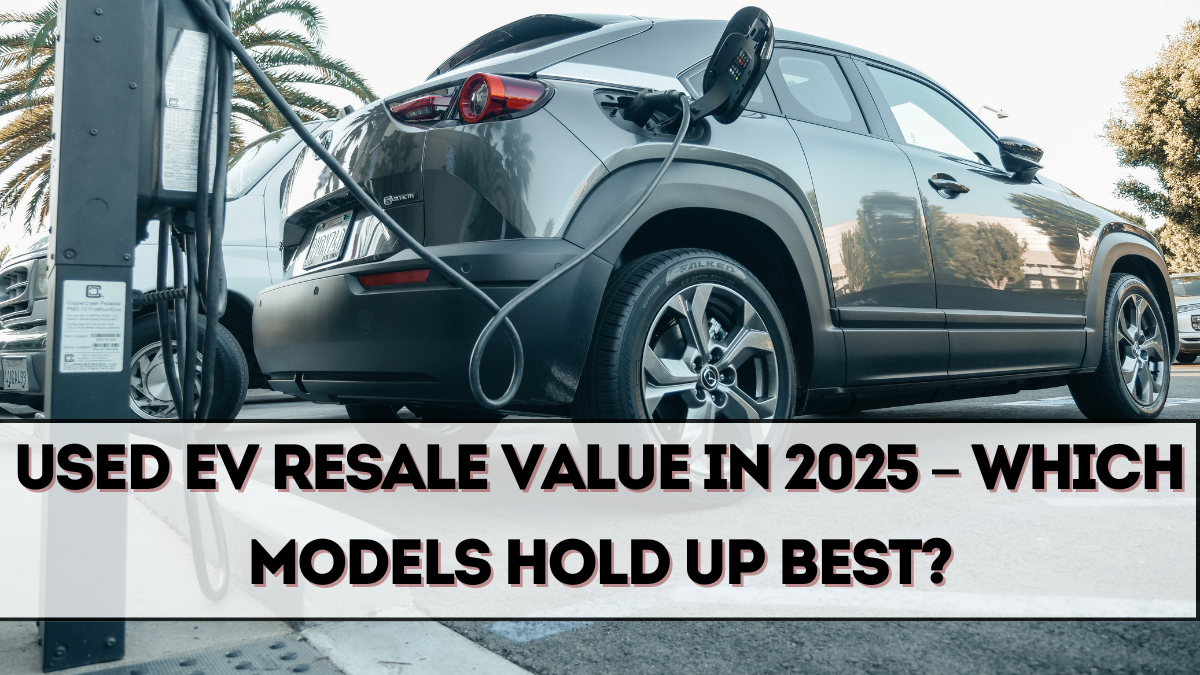The electric vehicle (EV) market has grown rapidly in the past five years, but a new challenge is emerging in 2025: resale value. While EVs are celebrated for their eco-friendliness and lower running costs, many owners are discovering that depreciation rates can be higher compared to petrol or diesel cars. The latest Used EV Resale Value Trends reveal that some models hold their value remarkably well, while others struggle due to concerns about battery life, charging infrastructure, and market demand.
This article breaks down the latest data, exploring which EVs perform best in resale markets, what factors drive depreciation, and how buyers can make smart investments.

Why Resale Value Matters for EV Owners
Resale value directly affects the total cost of ownership. For many drivers, depreciation accounts for up to 40% of their car expenses. In the case of EVs, resale value is influenced by:
-
Battery Life: Buyers want assurance that the battery retains good health after years of use.
-
Charging Networks: Models with strong fast-charging support tend to attract better resale prices.
-
Government Policies: Subsidies on new EVs sometimes reduce demand for used ones.
-
Brand Trust: Established brands like Tesla or Hyundai perform better than newcomers.
Understanding these factors helps buyers and sellers position themselves in the growing second-hand EV market.
Depreciation Trends in 2025
The latest reports show that used EV depreciation is stabilizing, though still higher than some petrol cars. Key findings include:
-
Average Depreciation: EVs lose around 40–45% of value within three years, compared to 35–40% for petrol cars.
-
Tesla Advantage: Tesla models show stronger resale performance, often losing just 30–35% in three years.
-
Budget EV Struggles: Low-cost models from lesser-known brands may lose up to 50–55% of their value quickly.
-
Battery Improvements: Newer EVs with upgraded battery warranties see slower depreciation.
This demonstrates that while EVs depreciate faster in general, certain models are emerging as long-term value holders.
Top Performing Used EVs in 2025
Several models stand out for maintaining strong resale values.
-
Tesla Model 3
-
Market leader in resale with solid brand reputation.
-
Strong charging network support and battery reliability.
-
Retains around 65–70% of original value after three years.
-
-
Hyundai IONIQ 5
-
Praised for futuristic design and 800V fast-charging.
-
Maintains 60–65% of value after three years.
-
-
Kia EV6
-
Popular among family buyers, with strong demand in both US and Europe.
-
Holds around 62% of resale value after three years.
-
-
BYD Seal
-
Affordable pricing and Blade Battery safety boost resale.
-
Retains about 58–60% of value depending on region.
-
-
Porsche Taycan
-
Luxury EV with niche buyers, strong brand recognition.
-
Maintains 65% value even after heavy usage.
-
These models are now benchmarks for used EV resale 2025 performance.
EVs Struggling in Resale
Not all EVs perform well.
-
Budget Chinese Imports: Struggle due to weak charging support and limited trust.
-
Older Nissan Leaf Models: Early editions with shorter ranges face heavy depreciation.
-
Luxury EV Sedans: Some premium models drop faster due to high entry prices and niche demand.
Buyers are becoming selective, focusing on models with proven durability and wide charging access.
Role of Battery Life in Resale
Battery performance is the single biggest factor in resale pricing. In 2025:
-
Warranties: Models with 8–10 year battery warranties retain more value.
-
Battery Health Reports: Buyers demand certified reports on battery life before purchase.
-
Fast Charging Impact: Cars frequently charged at high speeds may show faster battery degradation, reducing resale.
With these insights, sellers must maintain charging discipline to protect long-term value.
Market Outlook for Used EVs
The used EV market is set to grow significantly:
-
Supply Growth: As early EV buyers upgrade, more used EVs enter the market.
-
Price Balance: Falling prices make EVs more accessible to middle-income buyers.
-
Policy Push: Governments encouraging second-hand EV sales to promote wider adoption.
-
Insurance Role: Cars with strong safety ratings are easier to insure, boosting resale demand.
This shows that used EVs will become a key part of the auto industry within the next five years.
Tips for Buyers and Sellers
For those looking to buy or sell in 2025:
-
Buyers: Focus on models with long battery warranties and reliable charging compatibility.
-
Sellers: Maintain a charging routine that protects battery health and keep full service records.
-
Dealers: Offer certified pre-owned programs to boost buyer trust.
-
Investors: Consider models with proven resale history like Tesla and Hyundai.
By applying these strategies, both buyers and sellers can make the most of the used EV market.
Future of Used EV Resale
By 2030, industry experts expect:
-
Solid-State Batteries: Longer lifespans, reducing depreciation.
-
AI-Based Resale Platforms: Real-time valuation tools for fair pricing.
-
Increased Demand: Growing acceptance of EVs across all price ranges.
-
Global Standardization: Unified resale certification for cross-border sales.
The Used EV Resale Value Trends of 2025 confirm that the second-hand EV market is maturing, and informed buyers can make smart choices.
FAQs
Do EVs depreciate faster than petrol cars?
Yes, on average EVs depreciate slightly faster, around 40–45% in three years, compared to 35–40% for petrol cars.
Which EV has the best resale value in 2025?
The Tesla Model 3 leads the market, retaining up to 70% of its original value after three years.
Does battery health affect resale value?
Absolutely. Battery performance and warranty coverage are the most important factors in determining resale price.
Is it a good time to buy a used EV in 2025?
Yes, falling prices and improved warranties make 2025 a strong year for buyers to enter the EV market.
Click here to know more.
